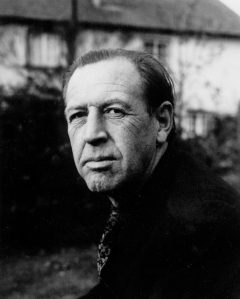If on a winter’s night: Raymond Williams in Hackney
by thenewenglishlandscape
Raymond Williams, White Cottage, Hardwick, Cambridgeshire, 1969
Almost exactly forty years ago, on the 8th of January 1982, the writer and critic Raymond Williams gave a talk for the Hackney Workers’ Educational Association on the subject,‘Popular Forms of Writing’. It was a great scoop to have got him as a guest lecturer, but Williams was generous in this regard, as many came to know. Less lucky that evening were the conditions. Early that afternoon a scattering of snow turned into a full-blown blizzard, of the sort that led to train cancellations, cars stuck in snowdrifts, and an eerie silence in the gloomy, sodium-lit streets of Dalston. The talk was held in the unheated basement of the Centerprise community bookshop, which in the daytime was used as an Under-5s nursery, but when the play equipment was packed up could be used in the evening for events.
Raymond and his wife, Joy, were wholly unperturbed by this or the scratch meal we gave them beforehand. Starting on time, Williams spoke for exactly an hour without notes to a wet, bedraggled but intent audience, creating one of those evenings you remember for the rest of your life. After questions, now standing in the driving snow on Kingsland High Street, we finally managed to flag down a taxi, and Raymond and Joy disappeared into a snowstorm, heading towards Liverpool Street Station and the train back to Cambridge. Everybody else went to the pub.
Just over a year ago I got an email from Phil O’Brien, Secretary of The Raymond Williams Society, telling me he was editing a collection of unpublished talks and essays by Williams, one of which – to my surprise – was based on that talk. Unknown at the time it had been recorded, presumably by Joy, and discovered only recently. The book has now been published by Verso, Culture and Politics, with the Hackney lecture included.
The talk given that night in Hackney is now one of ten newly published essays. To my mind it has an unusual, engaging directness, opening with a warm and dry-witted reference to the conditions of the talk and its unusual venue. I am sure it is the only essay of Williams that starts with an observation on the weather – remarking on the railway station notice referring to ‘due to adverse conditions’ – and going from there to develop a close exploration between formulaic official language, forms of writing, and the complicated relationship between writing and speech.
In this warm tribute to the circumstances of its radical bookselling and publishing setting, Williams went on to address many of the questions raised by the community publishing movement in the 1970s, in which Centerprise was involved, focusing on the relationship between speech and the printed word, which the Ruskin oral history movement had highlighted at this time but which was becoming fraught and contested.
Everybody learns to speak and to listen to other people speaking within familiar communities, without needing any formal instruction, Williams began. The problems start when you try to give that speech the ‘authority of print’, and then all kinds of cultural and political taboos come into play. He referred to the work of the poet John Clare, the gifted poet and close observer of the natural world, whose spelling and punctuation were condemned at the time as evidence of stupidity. There were also major barriers in the field of fiction, where the novel was highly formalised around certain plot devices – false inheritances, arranged marriages, fake wills, virtuous women compromised by scheming parvenus – which made a novel set in a close-knit, working class community unthinkable, formally regarded as having no narrative drama. Hence, Williams said, while we have extremely well-written working-class autobiographies in the 19th century, we have no novels.
Yet, as in some of those novels of hope delayed, the cassette tape recording of Williams speaking re-appeared after forty years, and like the mislaid letter in Middlemarch, it all moves on again.
KW
Special price offer on Culture and Politics, edited by Phil O’Brien: https://www.versobooks.com/books/3824-culture-and-politics



Thanks for that. I needed it!
Get Outlook for iOS
________________________________